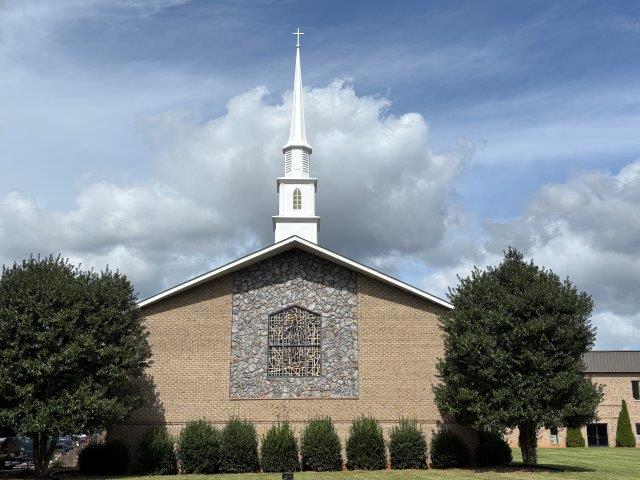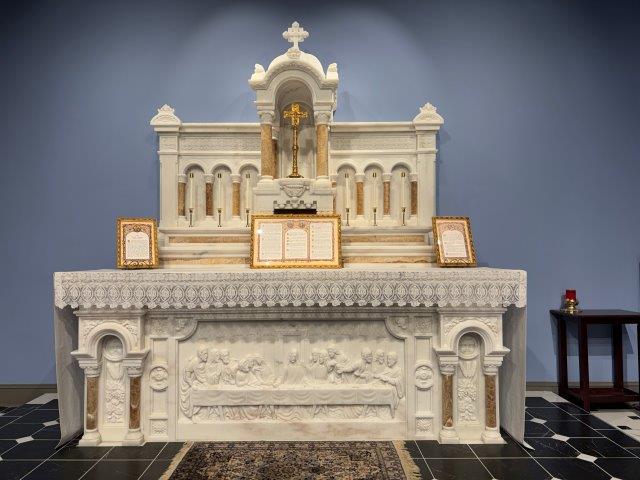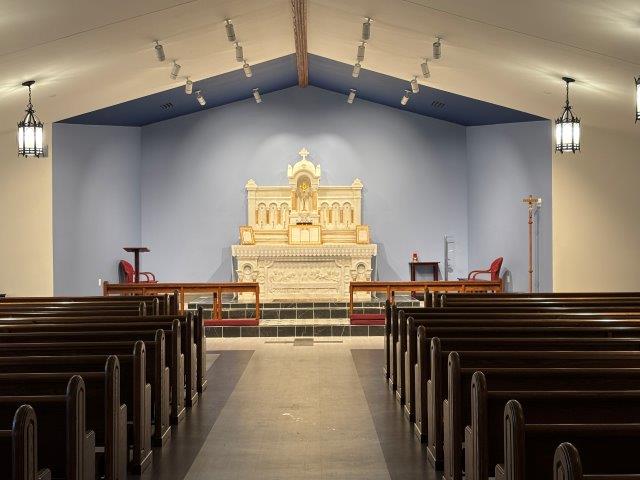Nineteenth Sunday after Pentecost
**Reminder: In the Diocese of Charlotte, Traditional Latin Masses are only offered at the Chapel of the Little Flower.
757 Oakridge Farm Highway, Mooresville, NC 28115
Sunday Latin Masses
10:00 a.m. (Low)
12:00 p.m.(Sung)
All other Latin Masses at the diocesan parishes have been discontinued. See schedule below.




Chapel of the Little Flower
Friends in Christ,
Welcome to our weekly Sunday update. This Sunday is the Nineteenth Sunday after Pentecost. In the Gospel reading for the day (Matthew 22:1-14), Jesus tells about the parable of the marriage feast, which likens the Kingdom of heaven to a wedding banquet. According to the Fr. George L. Haydock Bible Commentary, the king, symbolizing God the Father, sends his servants, represented by Saint John the Baptist and Jesus, to call the invitees (Jews) to the marriage feast in heaven, yet they would not come. Instead “they neglected: and went their ways, one to his farm, and another to his merchandise; and the rest laid hands on his servants, and having treated them contumeliously, put them to death.” Then the invite is extended to the Gentiles, but these new invitees, to be admitted, must wear the wedding garment of grace, free from the guilt of sin, “For many are called, but few are chosen.”
The symbolism of a wedding feast and a king this Sunday is also providentially timed as this week (Tuesday October 21) is the 114th wedding anniversary of Blessed Karl of Austria to his wife, Servant of God, Zita de Bourbon Parma. Blessed Karl’s feast day is October 21 (local feast), which is not the date of his death, but of his marriage to Empress Zia. Please see our Saints and Special Observances on the life and virtue of this heroic, last reigning Catholic emperor of Europe and one of the patron saints of the Carolina Traditional Liturgy Society.
**Diocese of Charlotte Announces New Latin Mass Chapel**
The Diocese of Charlotte has announced the Chapel of the Little Flower, which is now the only location where the Traditional Latin Mass will be offered for the Diocese of Charlotte.
Chapel of the Little Flower
Mooresville, NC 28115
Sunday Latin Mass Times
- 10:00 a.m. (Low)
- 12 noon (Sung)
Holy Days: TBA
- Chaplain: Fr. Brandon Jones
- More details: https://carolinaliturgy.org/chapel
- Diocesan Announcement: Chapel of the Little Flower to open for Traditional Latin Masses Oct. 5
We will share additional information about the chapel when announced by Father Jones.
Saint Thérèse of the Child Jesus and the Holy Face, the Little Flower, pray for us!
Calendar of Special Observances
Celebrations are those listed in the Roman Missal of 1962.
DAY, DATE – FEAST (CLASS)
Sunday, October 19 – Nineteenth Sunday after Pentecost (II)
Monday, October 20 – St. John Cantius, Confessor (III)
Tuesday, October 21 – St. Ursula and Companions, Virgins and Martyrs (IV) – Commemoration of St. Hilarion, Abbot
Wednesday, October 22 – Feria (IV)
Thursday, October 23 – St. Anthony Mary Claret, Bishop and Confessor (IV)
Friday, October 24 – St. Raphael the Archangel (III)
Saturday, October 25 – (USA) St. Isidore the Farmer, Confessor (III) – Our Lady on Saturday (IV) – Commemoration of Ss. Chrysanthus and Daria, Martyrs
Nineteenth Sunday after Pentecost
The links provided below can be used to download printable copies of the Proper Prayers for the Nineteenth Sunday after Pentecost with either English or Spanish translation, followed by commentary by Dr. Michael P. Foley.
Traditional Latin Mass Schedule
Diocese of Charlotte Sunday Masses
Chapel of the Little Flower (757 Oakridge Farm Road, Mooresville, NC)
- 10:00 a.m. (Low)
- 12:00 p.m. (Sung)
Note: Only Sunday Latin Masses and Holy Days will be offered at the Chapel. All other Sunday and daily Traditional Latin Masses at the other diocese of Charlotte parishes have been discontinued. These changes only affect Latin Masses in the diocese of Charlotte.
Diocese of Raleigh Sunday Masses (See correction note)
- 1:00 p.m., Sacred Heart (Dunn, NC)
- 4:30 p.m. - First Sunday, Holy Name Cathedral (Raleigh, NC) (Correction: Last week we incorrectly listed this Mass as Fourth Sunday when instead it is only offered on First Sunday. We apologize for the error.)
- For additional locations and Masses please see our Mass Times webpage
Diocese of Charleston Sunday Masses
- 12:00 p.m., Prince of Peace (Taylors SC)
- 1:00 p.m., Our Lady of the Lake (Chapin SC)
- 12:00 p.m., Sacred Heart (Charleston SC)
- 5:30 p.m., Stella Maris (Sullivans Island, SC)
Diocese of Charleston Daily Traditional Latin Masses
- Prince of Peace (Taylors SC) – Monday-Friday, 12:00 p.m.
- Prince of Peace (Taylors SC) – Saturday, 8:00 a.m.
- For additional locations and Masses please see our Mass Times webpage
Special Announcements
Enroll the Souls of the Faithful Departed
The Traditional Carmelite Hermits of Our Lady of Mt. Carmel (Colorado and Pennsylvania) are happy to announce an All Souls Enrollment during the month of November. Throughout this month, the community will dedicate 30 Holy Masses (Traditional Carmelite Rite), along with the daily prayers and sacrifices of the Brothers, for the souls of the faithful departed who are enrolled. You may recall their Lenten Enrollment offering each spring, and now they are offering an All Souls Enrollment for the faithful departed. To learn more or enroll, click here.
Announcements
Support Our Parishes – Recently, Father Reid noted that Saint Ann parish will bear much of the financial costs of keeping the Chapel of the Little Flower open and encourages our continued generosity (and our occasional visits!). Parishioners from other parishes should continue to support their own parish.
Sunday’s 12:30 p.m. Mass intention at Saint Ann – Mass this Sunday October 19 at 12:30 p.m. (now Novus Ordo) will be offered for the repose of the soul of Count Riprand of Arco-Zinneburg, the great-grandson of the last King of Bavaria, Ludwig III who lived in Charlotte for several years. Count Arco married Archduchess Maria Beatrice of the von Habsburg family, the granddaughter of Blessed Karl of Austria and they lived in Charlotte in the 1980s where they started a property development company which built several retail and commercial centers in the area.
In 2018, the couple, now living in Austria, paid a visit to Charlotte and attended Saint Ann’s Latin Mass. Sadly Count Arco passed away in 2021 but the family visited Saint Ann again that year to organize a memorial Mass for the Count, for the benefit of his local friends and colleagues. We invite readers, wherever they attend Mass, to please consider praying this Sunday for the repose of the soul of Count Arco, our small connection to Blessed Karl and Catholic royalty.
Rosary for the Traditional Latin Mass – A rosary will be offered for the restoration of the Traditional Latin Mass in the church after the 11:30 a.m. Novus Ordo Mass at Saint Thomas Aquinas on Sundays.
New Christ the King Podcast Series – The Institute of Christ the King Sovereign Priest (an order of priests which offers the Traditional Mass exclusively) has launched a 4-part podcast series on the origins and meaning of the Feast of Christ the King, which is commemorated on the last Sunday of October in the 1962 calendar. The first episode can be viewed in Traditional Latin Mass and Liturgical News section below.
**New Book** The Cassock: Sign of Christ, Sign of Contradiction, by Fr. Lawrence Carney (with Cardinal Burke’s Forward) – Slaying Dragons Press is releasing an excellent book on the cassock, authored by Fr. Lawrence Carney, the Holy Face priest (who visited St. Thomas Aquinas parish a few years ago). The Cassock: Sign of Christ, Sign of Contradiction examines the powerful witness of the cassock and its impact on both the priest and faithful. Slaying Dragons Press, is run by St. Thomas Aquinas parishioner and local writer Charles Fraune. To pre-order your copy, click here.
Daily Holy Face Chaplet for Sacred Liturgy (perpetual novena) – For the preservation of the Traditional Latin Mass, it has been recommended to all friends of the sacred liturgy in the diocese to consider continually praying the powerful Holy Face chaplet, under the banner of Our Lady of the Holy Name. To pray the chaplet, please see this link.
Cardinal Burke’s Prayer for Pope Leo XIV – His Eminence Cardinal Raymond Burke has released a prayer for Pope Leo XIV. Please see the prayer at the links below and consider praying this daily for the Holy Father as he leads the Church. PDF copies can be accessed at these links: [English] [Español] [Latin]
Holy Face Devotions
Prayers of Reparation to the Holy Face of Jesus are offered each week at the following churches on the indicated days:
- St. James (Concord) – Monday, 10-10:30 a.m. (in the cry room)
- St. Mark – Tuesday, 5:30 p.m.
- St. Thomas Aquinas – Tuesday, 6:00 a.m.
- St. Ann – Tuesday, 7:30 a.m. (following 7:00 a.m. Mass)
- St. Michael the Archangel (Gastonia) – Tuesday, 8:30 a.m. (following 8:00 a.m. Mass)
- St. Vincent de Paul – Tuesday, 8:40 a.m.
- Holy Spirit (Denver) – Tuesday, 10-11:00 a.m. (following the 9:15 a.m. Mass)
- Saint Elizabeth of the Hill Country (Boone) – Third Tuesday, at 6:45 p.m. after Mass in the Youth Room
- St. John the Baptist (Tryon) - First Saturday, 9:30 a.m. (after 8:30 a.m Mass)
Note: Days and times may be subject to change due to holidays.
“Jesus, Your ineffable image is the star which guides my steps. Ah, You know, Your sweet Face is for me Heaven on earth” (from Canticle to the Holy Face by Saint Thérèse de Lisieux, the 19th century Discalced Carmelite nun who took the name in religion, Thérèse of the Child Jesus and the Holy Face).
Traditional Latin Mass and Liturgical News
- Quas Primas and Christ the King Podcast Series, Episode 1: Historical Context (video), Institute of Christ the King Sovereign Priest (October 11, 2025). [Christ the King Podcast]
- The Rare Catholic Ritual You’ve Never Seen Before (video), Shrine of Our Lady of Guadalupe (October 1, 2025). [Rare Catholic Ritual]
- The Fire of Faith: Guard the Flame (video), Our Lady of Clear Creek Abbey (October 1, 2025). [Fire of Faith]
- The Catholic Heart of California by Rachel Shrader, Holy Hidden Highways (October 10, 2025). [Catholic Heart of California]
- Edward the Confessor and John the Evangelist by Greg DiPippo, New Liturgical Movement (October 13, 2025). [Edward the Confessor]
- The Maternity of the Virgin Mary by Greg DiPippo, New Liturgical Movement (October 11, 2025). [The Maternity of the Virgin Mary]
- St. Peter and the Sea by Fr. William Rock, FSSP, The Missive (October 6, 2025). [St. Peter and the Sea]
- A Review of The Roman Canon and The Words of the Missal by Dr. Michael P. Foley, New Liturgical Movement (October 3, 2025). [The Roman Canon]
- Pope Leo urges Catholics to pray daily Rosary for Peace in October by Devin Watkins, Vatican News Service (September 24, 2025). [Rosary for Peace]
Saints and Special Observances
Blessed Emperor Charles (Karl) of Austria – As noted above, this Tuesday is the 114th anniversary of the marriage between Blessed Emperor Charles von Habsburg of Austria and Servant of God Empress Zita de Bourbon Parma. It is also the feast day (locally, new calendar) for Blessed Karl. As such, we reshare our post from last April (anniversary of his death) that includes excerpts (with some minor adaptations) of his life from the Emperor Karl League of Prayer website which promotes the cause of his canonization here in the United States.
Karl
of the House of Austria was born on August 17, 1887, at Schloss
Persenbeug in Lower Austria. His parents were Archduke Otto and Princess
Maria Josepha of Saxony, daughter of the last king of Saxony. Emperor
Franz Joseph I was Karl's great uncle. From an early age, Karl fostered a
great devotion to the Blessed Sacrament and the Sacred Heart of Jesus.
He used prayer to guide him in making all important decisions.
On October 21, 1911, he married Princess Zita of Bourbon-Parma. During
the ten good years of their happy and exemplary marriage, the pair were
given eight children.
On June 28, 1914, because of the assassination of Archduke Franz
Ferdinand, Karl became the heir apparent of the throne of
Austria-Hungary. In the middle of the First World War, the death of
Emperor Franz Joseph on November 21, 1916, made Karl the Emperor of
Austria. On December 20, 1916, he was crowned Apostolic King of Hungary.
Karl became the last Emperor of the Austro-Hungarian Empire in 1916,
during the First World War.
His Faith
Blessed Karl loved to pray throughout his life. He received Holy Communion daily, and at the end of mass prayed "Veni Creator." He prayed Morning Prayer, Evening Prayer, and the rosary daily. He frequently prayed the Litanies of the Sacred Heart, the Blessed Virgin Mary, and Saint Joseph; he was a member of Our Lady's Confraternity and wore the scapular. Karl was devoted to adoring the Blessed Sacrament, and could happily spend hours in adoration.
Karl of Austria was obedient to the Holy Father, acknowledging him to be the Vicar of Christ; and he treated bishops and priests with respect. From the testimony of those who knew him well, it is clear that Blessed Karl took his faith seriously and fostered his relationship with God, devoutly following the teachings of the Roman Catholic Church.
The Peacemaker
The most sacred obligation of a king—to provide peace—became the primary focus of Karl's efforts during this horrific war. The only world leader to do so, he supported the peace proposals of Pope Benedict XV.
From the very beginning of his reign, Karl worked to create peace for his empire. He had been against the declaration of war, and now he was in a position to put an end to the needless killing and fighting. In his accession speech he proclaimed: "I will do all within my power to banish the horrors and sacrifices of war at the earliest possible date and to win back for my peoples the sorely missed blessings of peace . . ."
During a most difficult time domestically, he offered extensive assistance to his people and gave example to them by passing social legislation in conformity with Catholic social teachings.
His stance prevented civil war from occurring during the post-war transition of government. Yet still he was banished from his homeland.
His Death
At the request of the pope, who feared that communism would overtake Central Europe, Karl attempted to restore his government and return to the throne of Hungary. Two attempts failed because he wanted to avoid civil war at all costs. Karl was then sent into exile on Madeira. He saw his abandonment there as a commission from God, a duty he could not put aside.
In exile on the island of Madeira, he lived with his family in poverty, in a damp house. There, Karl contracted a fatal illness, which he accepted as a sacrifice to make for the peace and unity of his people.
His wife stayed with him throughout most of his final ordeal. He forgave those who betrayed him, and prayed for his subjects. On the evening before he died, he uttered: "I must suffer like this so that my peoples can come together again." But his most frequent pray was: "Thy Will be done!"
He later requested Holy Communion, which a priest, Father Zsambóki, administered to him, and anointed him a final time. The Eucharist was exposed in his room, and he prayed in the Lord's presence. About ten minutes before he died, he prayed: "Thy Holy Will be done. Jesus, Jesus, come! Yes-yes. My Jesus, as You will it-Jesus."
Then he whispered "Jesus" softly, and died. It was shortly after noon on Saturday, April 1, 1922. He was only 34 years old.
Canonization Process
In 1949, Karl was given the title, Servant of God. In 1972, on the fiftieth anniversary of his death, the tomb of Karl was opened and his remains were found remarkably well preserved. In April 2003 he was declared Venerable and in December the first miracle necessary for beatification was approved: a nun in Brazil with a debilitating illness was miraculously cured after praying for Karl’s intercession.
On October 3, 2004, Pope Saint John Paul II beatified Emperor and King Karl (whom the late pontiff, Karol Wojtiya, was named after as his father fondly served in Blessed Karl’s army). Blessed Karl's feast day is October 21, the date of his marriage to Empress Zita. In 2023, a miracle for his canonization began to be investigated.
The cause for Empress Zita’s canonization is also open and Clear Creek Abbey in Oklahoma is promoting her cause in the United States.
Source: Emperor Charles League of Prayer
Closing Commentary
We offer, in closing, an excerpt from the commentary of Dom Prosper Guéranger, OSB, on the “Nineteenth Sunday after Pentecost,” followed by a link to the full text of the commentary from The Liturgical Year.
Nineteenth Sunday after Pentecost
This Gospel has given to the present Sunday the name of the Sunday of the invited to the marriage. And yet, from the very opening of the dominical series, which began with the Descent of the Holy Ghost, the Church gave us the Gospel teaching, which she offers to us now, a second time, for our consideration. On the second Sunday after Pentecost, she related to us, from St. Luke, the parable of the great supper, to which many were invited, and which now St. Matthew, entering into fuller details, calls a marriage feast.
Set thus before us, both at the beginning and at the close of the liturgical season, over which the Holy Spirit reigns supreme—this parable is, as it were, the interpreter of the whole portion of the Year, which it thus hems in: it is an additional revelation of the true aim of the Church. But how much has the light not increased, since the first time we had these mystery-telling allegories! The certain man (homo guidam), who made a great supper, and invited many, is become the King, who makes a marriage for his Son, and in this marriage, gives us an image of the Kingdom of heaven.
The world’s history, too, has been developing, as we gather from the terms respectively used by the two Evangelists. Those who were the first invited and contented themselves with declining the kindness of the Master of the House, have grown in their impious ingratitude; laying hands on the messengers sent them by the loving kindness of the King, they treat them with contumely, and put them to death! We have seen the merited punishment inflicted on these deicides, by this Man, who was God himself, the father of Israel, now become King of the Gentiles: we have seen how he sent his armies to destroy them, and burn their City. And now at last, in spite of the refusal of the Invited of Juda, in spite of the treacherous opposition put by them against the celebration of the Nuptials of the Son of God, all things are ready for the Marriage, and the banquet hall is filled with guests.
Our heavenly King has confided to the ministers of his love the work of calling, and from every people, the new Guests: but now that his ambassadors, according to his command, have traversed the whole earth, bringing together all nations for this day of the joy of his heart—he himself is coming in person, to see that nothing is wanting to the due preparation for the Feast, and give the signal for the eternal banquet of the divine Nuptials. Now for such a feast, and in such a place, if there be any deficiency, it can only be on the part of the Guests. Let them, then, be careful not to draw down upon themselves, in this general and last examination, the displeasure of the great King, who has called them to an alliance with himself. [Nineteenth Sunday after Pentecost]